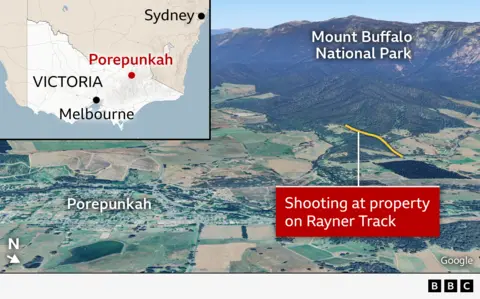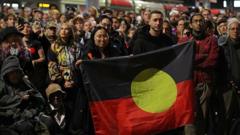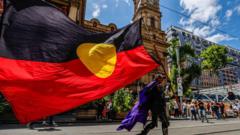In an alarming revelation regarding policing practices in Central Australia, the coroner conducting the inquest into the death of Kumanjayi Walker has concluded that the actions of the police reflected deep-rooted institutional racism. The findings were discussed at a gathering in Yuendumu, the community where Walker was tragically killed in a police incident.
In a report released following a two-year investigation, Coroner Elisabeth Armitage stated that the officer responsible for Walker's death, Constable Zachary Rolfe, exhibited racist sentiments normalized within his policing environment. The 19-year-old Walker was shot three times by Rolfe during an attempted arrest, an event that not only took Walker’s life but also ignited widespread protests against police violence and the disproportionate treatment of Indigenous Australians.
The inquiry shed light on how previous complaints regarding Rolfe’s aggressive conduct towards Aboriginal individuals were disregarded, illustrating a troubling pattern of neglect within the police force. Despite being charged with murder—a rare occurrence in cases involving on-duty police officers—Rolfe asserted self-defense and was acquitted in 2022.
As tensions escalated following Walker’s death, with public outcry focusing on the potential influence of racism on Rolfe's actions, the coroner's findings appear to confirm these fears. The incident, exacerbated by Rolfe shooting Walker after being stabbed with scissors, has become emblematic of a larger societal issue concerning Indigenous rights and police brutality.
Addressing the community directly, Armitage underscored the critical link between Rolfe's discriminatory beliefs and the operational culture of the Northern Territory Police. Her visit and the delivery of the findings aimed not only to bring closure to Walker's family but also to stimulate an ongoing conversation regarding systemic reforms needed to protect Indigenous lives in Australia.
In a report released following a two-year investigation, Coroner Elisabeth Armitage stated that the officer responsible for Walker's death, Constable Zachary Rolfe, exhibited racist sentiments normalized within his policing environment. The 19-year-old Walker was shot three times by Rolfe during an attempted arrest, an event that not only took Walker’s life but also ignited widespread protests against police violence and the disproportionate treatment of Indigenous Australians.
The inquiry shed light on how previous complaints regarding Rolfe’s aggressive conduct towards Aboriginal individuals were disregarded, illustrating a troubling pattern of neglect within the police force. Despite being charged with murder—a rare occurrence in cases involving on-duty police officers—Rolfe asserted self-defense and was acquitted in 2022.
As tensions escalated following Walker’s death, with public outcry focusing on the potential influence of racism on Rolfe's actions, the coroner's findings appear to confirm these fears. The incident, exacerbated by Rolfe shooting Walker after being stabbed with scissors, has become emblematic of a larger societal issue concerning Indigenous rights and police brutality.
Addressing the community directly, Armitage underscored the critical link between Rolfe's discriminatory beliefs and the operational culture of the Northern Territory Police. Her visit and the delivery of the findings aimed not only to bring closure to Walker's family but also to stimulate an ongoing conversation regarding systemic reforms needed to protect Indigenous lives in Australia.






















